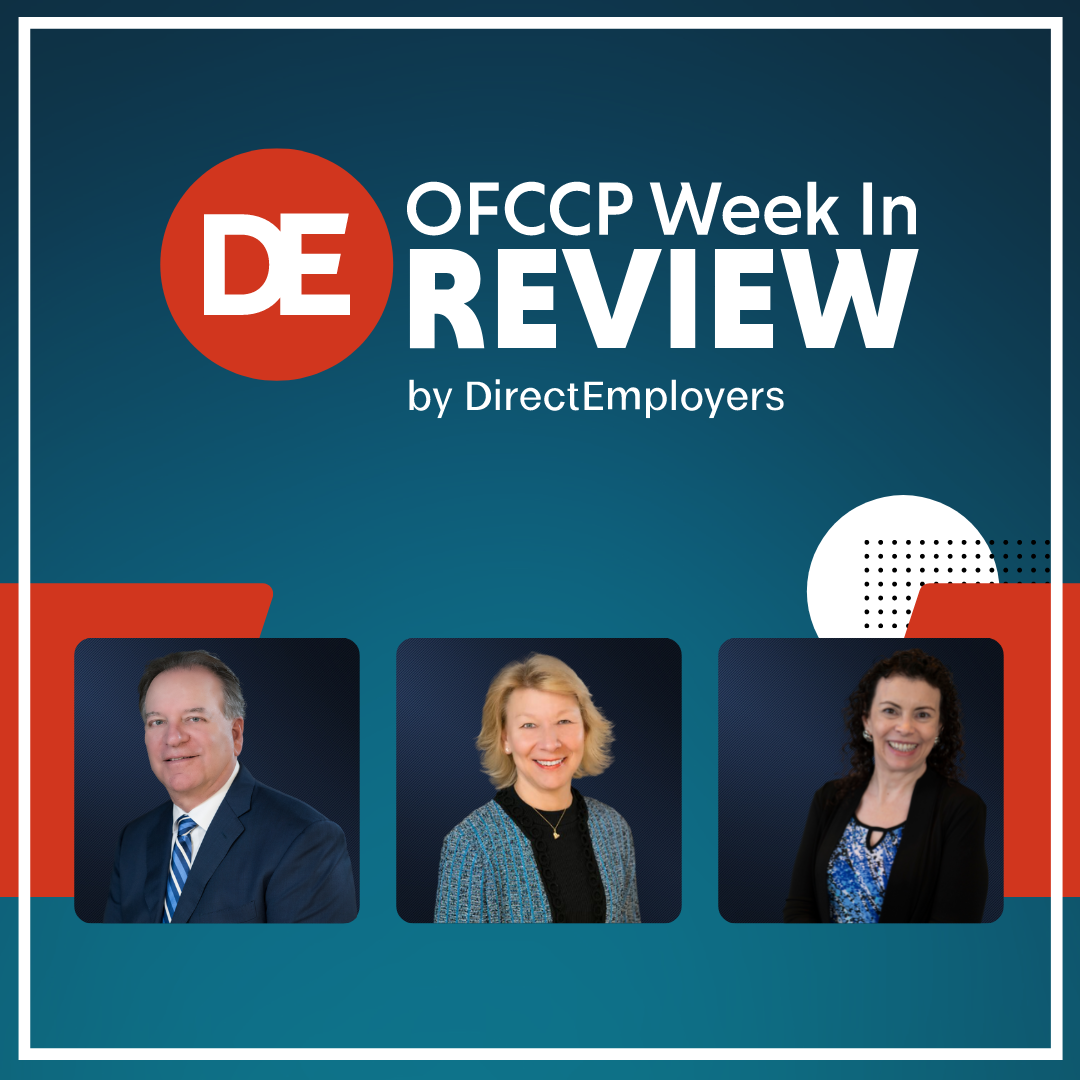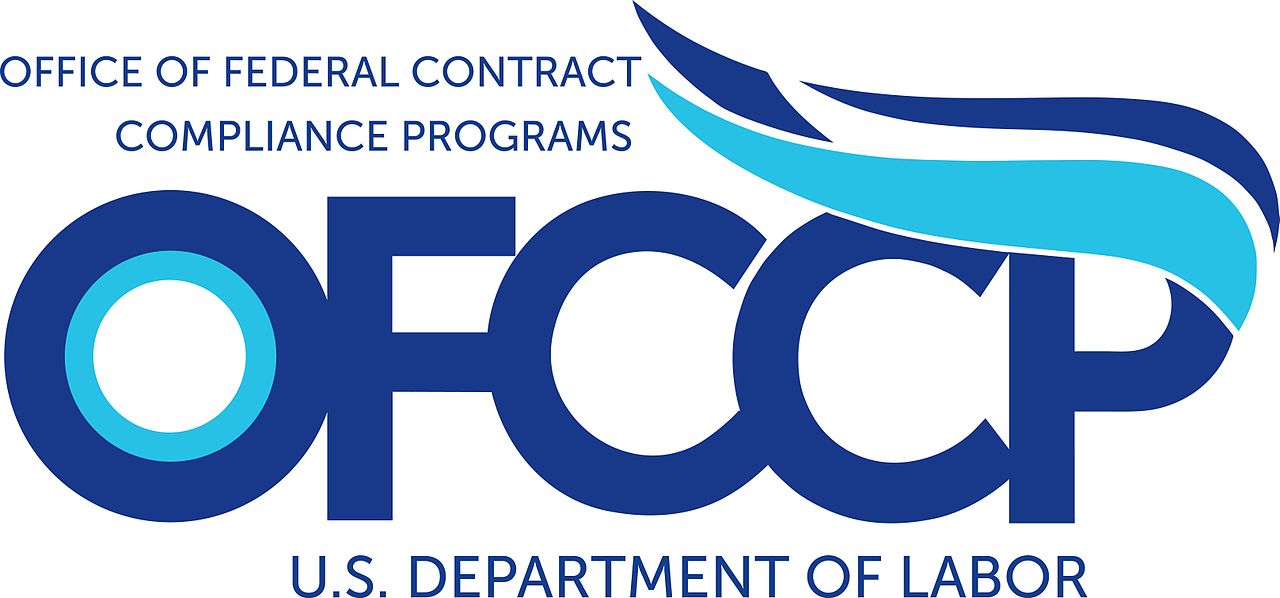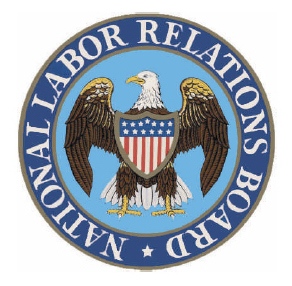
- Job Search Website Operator Agreed to Electronically Scan and Remove Language in Job Postings Which Limited Jobs in the U.S. to Foreign Applicants
- OFCCP Requested Public Comments (Again) on Proposed Changes to Disability Self ID Form
- OFCCP Quietly Updated (Again) FOIA Objection Submissions Deadline to March 31
- USDOL WHD Provided Second Comment Period on Proposal to Revise the Existing WD-10 Form for Federal Construction Contractors
- An Employer’s Failure to Post the Employee Rights Notice Will Now Cost $659 Per Violation
- USCIS Ended Covid Flexibilities for Response to Certain Notices & Requests
- In Brief
- Looking Ahead: Upcoming Date Reminders
Monday, March 20, 2023: Job Search Website Operator Agreed to Electronically Scan and Remove Language in Job Postings Which Limited Jobs in the U.S. to Foreign Applicants

Note: Title VII of the 1964 Civil Rights Act (“Title VII”) prohibits “employment agencies” (like DHI) and not just “employers” from engaging in employment discrimination Title VII makes unlawful.
The interest in this otherwise run-of-the-mill employment discrimination conciliation agreement is that DHI agreed to write computer code to use it to affirmatively ferret out potentially discriminatory keywords customers place in job search ads Dice.com distributes. Ironically, the EEOC is touting this settlement to demonstrate the utility of “Artificial Intelligence” (“AI”) to be used affirmatively to fight unlawful discrimination. At the same time, however, EEOC Chair Burrows has led an attack on AI employment tools fearful that they will somehow further unlawful employment discrimination. So, we are now led to understand that AI is thus a “two-edged sword” that could cut both ways.
Under the terms of the conciliation agreement resolving the case, DHI agreed to rewrite its programming code to “scrape” ads customers deliver to Dice.com for potentially discriminatory keywords – such as “OPT (Optional Practical Training),” “H-1B” or “Visa” – that appear near the words “only” or “must” in its customer’s new job postings. The company also agreed to revise its guidance to customers on its “Job Postings not permitted on Dice” website pop-up to include instructions to avoid language such as “H-1Bs Only” or “H-1Bs and OPT Preferred.” DHI also agreed to compensate the estate of the original complainant, according to an EEOC press release announcing the settlement.
The EEOC Press Release also cast the settlement as an example of the benign use of Artificial Intelligence in employment selection matters:
“DHI’s use of programming to ‘scrape’ for potentially discriminatory postings illustrates a beneficial use of artificial intelligence in combatting employment discrimination,” said Chelsae J. Ford, systemic coordinator for the EEOC’s Miami District, in the press statement.
While “Artificial Intelligence” does not have an accepted universal definition, it is doubtful whether this is indeed an “Artificial Intelligence” response to the allegedly discriminatory job ads which attracted the national origin discrimination Charges alleging National Origin discrimination. The electronic “scraping” and purging DHI agreed to apply to its customer job ads is merely a Boolean search and replace function (a mathematical algebraic concept first conceived and applied in the mid-19th century, applied to computers in the late 1940’s at the beginning of the computer age, and popularized by Google beginning in the late 1990s as it began its ascent to the top of the world of digital search.) While digital in nature, many would not consider Boolean searches to be “AI” since they do not either intimate human thinking or replace it. But so many people are currently excited to be associated with anything AI or sounding like AI. New buzzword in the dictionary.
In 2021, the EEOC launched its Artificial Intelligence (AI) and Algorithmic Fairness Initiative to ensure that the use of software, including AI and other emerging technologies used in hiring and other employment decisions, comply with the federal civil rights laws that the EEOC enforces.
Last month, the Commission held a virtual hearing to examine the use of automated systems, including AI, in employment decisions. Although the hearing featured three separate panels with four panelists each (12 total), Republican Commissioners Keith Sonderling and Andrea Lucas both expressed frustration over the lack of representation of those involved in AI systems production and employer implementation among the panelists that did not allow for education from the vendors developing appropriate AI technologies for the workplace.
Wednesday, March 22, 2023: OFCCP Requested Public Comments (Again) on Proposed Changes to Disability Self ID Form
Like Related VEVRAA Request 2 Weeks Ago, New Notice References Previous November Notice

An ICR is OMB-speak to describe an agency’s request to OMB, pursuant to the Paperwork Reduction Act, for permission to impact the public with a request for information or documents.
How We Got Here
In our report on OFCCP’s initial November 16, 2022, Federal Register notice, we explained that OFCCP published proposed changes to its Disability Self-Identification Form to update the preferred language used to describe specific disabilities. The proposed revised form is available here. The current OMB approval for this Section 503 ICR expires on May 31, 2023.
The November 16, 2022 notice not only covered OFCCP’s request to OMB to extend approval of its ICRs under Section 503, but also the agency’s request for an extension, without change, of its currently-approved Vietnam Era Veterans’ Readjustment Assistance Act (“VEVRAA”) ICR. OMB’s current approval for the VEVRAA ICR expires on April 30, 2023. The VEVRAA and Section 503 AAP and self-identification requirements run parallel with each other (but not the “Job Listing” requirements (unique to VEVRAA) or the “Benchmarks for hiring” (also unique to VEVRAA)). The comment period on the November Federal Register notice closed on January 17, 2023.
OFCCP submitted to OMB two Supporting Statements regarding the November 2022 Notice (both dated November 8, 2022). In its Supporting Statement for the VEVRAA ICR, OFCCP said it was not proposing to collect any new information. For the Section 503 ICR, OFCCP noted in a separate Supporting Statement that the proposed changes are part of “an overall effort to increase the response rate on the form.” In the proposed revised form, the OFCCP re-alphabetized the list of disabilities with additional examples and current language. The agency also made “plain language” edits and minor formatting changes.
New Notice Corrected Odd Omission From Notice Two Weeks Earlier
Two weeks ago, we reported that OFCCP posted a similar notice on March 8, also referencing the November 16, 2022, notice, but, oddly, covering only the VEVRAA ICR. In that story, we noted that OFCCP did not explain in the March 8 notice why it did not also repeat the November 2022 notice as to the Section 503 ICR. With the March 22 notice, OFCCP now has done so, albeit two weeks later.
As to the new Section 503 notice, the OMB website indicates that OFCCP submitted a new Section 503 ICR on March 22, 2023 (the same day as the corresponding Federal Register publication). OFCCP also submitted a new Supporting Statement to cover this new Section 503 ICR. Notably, that new Section 503 Supporting Statement is dated March 1, 2023 – the same date as the latest VEVRAA ICR we reported two weeks ago.
As with the latest VEVRAA Supporting Statement, the new Section 503 Supporting Statement was similar to OFCCP’s November 2022 Section 503 Supporting Statement regarding its original November 2022 ICR. However, OFCCP added a new discussion about the only comment submitted in response to its original November 16, 2022. That discussion implied that OFCCP had rejected the suggestions made in the comment as to the Section 503 ICR. Similar to the discussion in the latest VEVRAA Supporting Statement, OFCCP explained its rejected the employer association’s suggested changes to the definitions of key personnel activity terms used in the so-called “data metrics” analyses covered federal Government contractors are obligated to undertake pursuant to Section 503 and VEVRAA.
Wednesday, March 22, 2023: OFCCP Quietly Updated (Again) FOIA Objection Submissions Deadline to March 31

In the latest development in the continuing odyssey of OFCCP’s struggle to respond to a Freedom of Information Act (“FOIA”) request for certain EEO-1 filings in its possession, the agency quietly updated Question 10 of its FAQ section for the OFCCP Submitter Notice Response Portal to state that “[a]ll written objections must be received by March 31, 2023.”
At the same time, OFCCP has also sent out letters to (baffled) contractors that have neither responded to OFCCP’s invitation to advise the agency that
- they permit OFCCP’s proposed disclosure of their EEO-1 files; and
- have not objected to OFCCP’s proposed disclosure of their responsive EEO-I filings.
Our most recent update of this ongoing saga discussed OFCCP’s posting of the “Second Updated Non-Objector Contractor List” (the third disclosure list OFCCP has published) as of March 03, 2023. At that time, OFCCP had said that written responses to the updated list were due March 17 (now extended again, this time to March 31st, as we report above).
Contractors that believe they were improperly included on the Second Updated List, may object by sending an email to OFCCP-FOIA-EEO1-Questions@dol.gov, including at a minimum the following information:
- all addresses associated with your entity for the reporting years in which your entity is listed;
- your entity’s EEO-1 unit number;
- any other entities associated with your organization (including, e.g., merged companies and subsidiaries) that you intend to cover in your objection, with any additional entity information needed to confirm the objection (including EEO-1 unit number and address, if different from those identified in response to (1) and (2)).
Thursday, March 23, 2023: USDOL WHD Provided Second Comment Period on Proposal to Revise the Existing WD-10 Form for Federal Construction Contractors

How We Got Here
The new notice references a June 15, 2022, Federal Register notice of the WHD’s proposal to revise the WD-10 form and create a new WD-10A pre-survey form that will be used to identify potential respondents to the WD-10. (See our story on the earlier notice here.) The WHD proposed doing away with asking respondents to determine a peak week(s) of construction for reported projects, identify the project value, or identify contractors or subcontractors on the project. Additionally, the proposed form uses a “picklist” of labor classifications from which a respondent may choose, rather than requiring the respondent to manually enter the labor classification into an open text field. These proposed changes to the WD-10 form, among others, are designed to increase the ease of participating in a survey and to solicit more usable wage data to issue more comprehensive wage determinations.
The proposed new WD-10A collection instrument would be a companion form to the WD-10 form. It would be a “pre-survey to identify potential respondents that performed construction work within the survey period in the survey area, which will enable the Department to solicit for survey participation.”
The 60-day comment period on the June 15, 2022, notice closed on August 15, 2022. OMB received 26 comments in response to that notice. The WHD discussed those comments in a Supporting Statement it submitted to OMB on March 16, 2023. Those comments are available here.
OMB’s approval for the existing WD-10 Information Collection Requirements expires on March 31, 2024.
Thursday, March 23, 2023: An Employer’s Failure to Post the Employee Rights Notice Will Now Cost $659 Per Violation
Penalty Increased by 7.68%
Required Poster Updated Last October

History of Adjustments
- 2022 from $576 to $612 per violation
- 2021 from $525 to $576 per violation
- 2016 from $210 to $525 per violation
- 2014 from $110 to $210 per violation
- 1997 from $100 to $110 per violation
Be Sure to Post Current Employee Notices
Last October, we reported the EEOC updated its Employee Rights Poster. Over a week after the EEOC posted its updated poster, OFCCP also updated its posting requirements (see our report here).
On a related note, we reported back in January that the U.S. Department of Labor similarly adjusted its civil monetary penalties.
Thursday, March 23, 2023: USCIS Ended Covid Flexibilities for Response to Certain Notices & Requests

- Requests for Evidence;
- Continuations to Request Evidence (N-14);
- Notices of Intent to Deny;
- Notices of Intent to Revoke;
- Notices of Intent to Rescind;
- Notices of Intent to Terminate regional centers;
- Notices of Intent to Withdraw Temporary Protected Status; and
- Motions to Reopen an N-400 Pursuant to 8 CFR 335.5, Receipt of Derogatory Information After Grant.
Furthermore, employers that wish to file Form I-290B, Notice of Appeal or Motion, or Form N-336, Request for a Hearing on a Decision in Naturalization Proceedings (Under Section 336 of the INA), regarding a decision dated after March 23, 2023, must comply with the deadlines in the form instructions.
Certain 1-9 Form Flexibilities Set to Expire in July
In a related development last October, we reported that the U.S. Department of Homeland Security (DHS) and its Immigration and Customs Enforcement (ICE) agency announced another extension of their flexibility for employer compliance as to certain physical presence requirements for the documents the Form I-9, Employment Eligibility Verification otherwise requires. DHS and ICE once again extended their initial March 2020 guidance (updated at the end of March 2021) until July 31, 2023. For a detailed discussion of “How We Got Here,” including links to our multiple previous stories, see our August 2022 story, “USDHS ICE Issued A Proposal to Later (Perhaps?) Create Proposed Permanent Remote Form I-9 Documentation Procedures.”
In Brief
Tuesday, March 21, 2023: OFCCP Revealed Twelve FY 2023 Mega Construction Project Designees

Wednesday, March 22, 2023: U.S. NLRB General Counsel Issues Memo Employers Are Not Going To Like with Guidance to Regions on Severance Agreements

In that case, the NLRB ruled that an employer violates Section 8(a)(1) of the National Labor Relations Act (“NLRA”) when it offers employees severance agreements with confidentiality or non-disparagement provisions. (See our report on this decision here.)
The memo provides guidance on the decision’s scope and effect, such as the retroactive effect of the decision and the application of the decision to supervisors, according to an NLRB press statement. It also provides guidance on the kinds of severance agreement provisions that GC Abruzzo believes could violate the NLRA if proffered, maintained, or enforced, including confidentiality, non-disclosure, and non-disparagement provisions, among others.
Editor’s Note: In other words, with the Board’s view of the NLRA, this memorandum applies retroactively to all employer confidentiality, non-disclosure and non-disparagement requirements regardless of when and where written. The Board views severance agreements, as well as employee handbook provisions, imposing one or more of the three restrictions (confidentiality, non-disclosure, non-disparagement) to be unenforceable because violative of the NLRA. As to retroactivity, this also means that the Board’s view is that the McLaren decision struck down employer use of any of the three offending clauses back-in-time, to whenever the employer wrote the offending clauses. For example, the Board views a confidentiality agreement written in 2015 to no longer be enforceable.
Keep in mind that should the McLaren decision and GC Abruzzo’s interpretation of it become settled law under the NLRA, any retroactive severance agreements an employer created in prior years, may now be found to be in violation of the NLRA and thus unlawful and should be eliminated other than as to any trade-secret disclosure prohibitions.
Looking Ahead:
Upcoming Date Reminders
December 2022: U.S. DOL WHD’s (now overdue) target date to publish a Notice of Proposed Rulemaking to Analyze Public Comments on its proposed rule regarding Nondisplacement of Qualified Workers Under Service Contracts (RIN: 1235-AA42)
December 2022: U.S. OSHA’s (now overdue) target date to publish its Final Rule on Occupational Exposure to COVID-19 in Healthcare Settings (RIN: 1218-AD36) (OSHA submitted this Final Rule to OMB on December 7, 2022)
December 2022: U.S. DOL’s OASAM’s (now overdue) target date to publish Proposed Rule on “Revision of the Regulations Implementing Section 188 of the Workforce Innovation and Opportunity Act (WIOA) to Clarify Nondiscrimination and Equal Opportunity Requirements and Obligations Related to Sex” (RIN: 1291-AA44)
February 2023: U.S. DOL WHD’s (now overdue) target date for its Final Rule on Updating the Davis-Bacon and Related Acts Regulations (RIN: 1235-AA40)
March 2023: OFCCP’s target date for its Notice of Proposed Rulemaking to Require Reporting of Subcontractors (RIN: 1250-AA15)
March 2023: OFCCP’s target date for its Final Rule on Pre-Enforcement Notice & Conciliation Procedures (RIN: 1250-AA14)
March 2023: OFCCP’s target date for its Final Rule on “Technical Amendments” to Update Jurisdictional Thresholds & Remove Gender Assumptive Pronouns (RIN: 1250-AA16)
Friday, March 31, 2023 (at 2 pm ET): OFCCP Religious Exemption Rule Rescission Briefing webinar – Register here.
Friday, March 31, 2023: OFCCP scheduled to open its online Contractor Portal for covered federal Supply and Service contractors and subcontractors to certify that they have developed and maintained affirmative action programs for each establishment or functional unit – https://www.dol.gov/newsroom/releases/ofccp/ofccp20230320
Friday, March 31, 2023: Deadline extended to this new date (per updated FAQ #10) for contractors to inform OFCCP that they are incorrectly included on the agency’s updated “Non-Objector Contractor List” as to a reporter’s Freedom of Information Act (FOIA) request for EEO-1 Component 1 consolidated (Type 2) Survey data (previous February 17 and March 10 deadline extended) – https://www.dol.gov/agencies/ofccp/submitter-notice-response-portal
April 2023: OFCCP’s target date for its Notice of Proposed Rulemaking to “Modernize” Supply & Service Contractor Regulations (RIN: 1250-AA13)
Monday, April 3, 2023 (at 2 pm ET): DE Webinar | Creating Inclusive Virtual Apprenticeship Programs & More Accessible Workplaces – Register here
Friday, April 7, 2023: Comments due on OFCCP’s request to extend, without change, VEVRAA information collection requirements – https://www.regulations.gov/commenton/DOL_FRDOC_0001-2057
Wednesday, April 12, 2023: Comments due on the Office of Management & Budget’s “Initial Proposals for Updating Race and Ethnicity Statistical Standards” – https://www.regulations.gov/commenton/OMB-2023-0001-0001
Wednesday, April 12 – Friday, April 14, 2023: DEAMcon23 Chicago (Registrations open now; Agenda now available here!)
Wednesday, April 19, 2023: Deadline to submit comments on FTC proposal to ban employers from implementing most worker non-compete agreements (previous March 20 deadline extended) – https://www.regulations.gov/commenton/FTC-2023-0007-0001
Friday, April 21, 2023: Deadline to submit comments on OFCCP’s request to OMB to continue to use its Section 503 Individual With a Disability Self-Identification form
Monday, April 24, 2023: Deadline to submit comments on USDOL Wage & Hour Division’s Proposal to Revise Existing WD-10 Form for Federal Construction Contractors –
https://www.regulations.gov/commenton/DOL_FRDOC_0001-2065
Sunday, April 30, 2023: Deadline to apply for 2023 HIRE Vets Medallion Award Program – https://www.hirevets.gov/
May 2023: U.S. DOL WHD’s target date for its Notice of Proposed Rulemaking on Defining and Delimiting the Exemptions for Executive, Administrative, Professional, Outside Sales and Computer Employees (RIN: 1235-AA39)
May 2023: U.S. DOL WHD’s target date for its Final Rule on Employee or Independent Contractor Classification Under the Fair Labor Standards Act (RIN: 1235-AA43)
Tuesday, May 9, 2023: Public comment deadline on FTC’s “Request for Information” on franchise agreements and franchisor business practices – https://www.regulations.gov/commenton/FTC-2023-0026-0001
Thursday, June 29, 2023: Deadline for covered federal contractors and subcontractors to certify, via OFCCP’s online Contractor Portal, that they have developed and maintained affirmative action programs for each establishment or functional unit – https://www.dol.gov/newsroom/releases/ofccp/ofccp20230320
August 2023: U.S. NLRB’s target date for its Final Rule on Standard for Determining Joint-Employer Status (under the NLRA) (RIN: 3142-AA21)
August 2023: U.S. NLRB’s target date for its Final Election Protection Rule (RIN: 3142-AA22)
THIS COLUMN IS MEANT TO ASSIST IN A GENERAL UNDERSTANDING OF THE CURRENT LAW AND PRACTICE RELATING TO OFCCP. IT IS NOT TO BE REGARDED AS LEGAL ADVICE. COMPANIES OR INDIVIDUALS WITH PARTICULAR QUESTIONS SHOULD SEEK ADVICE OF COUNSEL.
SUBSCRIBE.
Compliance Alerts
Compliance Tips
Week In Review (WIR)
Subscribe to receive alerts, news and updates on all things related to OFCCP compliance as it applies to federal contractors.
OFCCP Compliance Text Alerts
Get OFCCP compliance alerts on your cell phone. Text the word compliance to 55678 and confirm your subscription. Provider message and data rates may apply.

